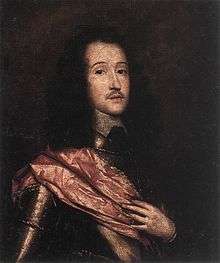To Althea, from Prison

To Althea, from Prison is a poem written by Richard Lovelace in 1642. The poem is one of Lovelace's best-known works, and its final stanza's first line ("Stone walls do not a prison make, Nor iron bars a cage") is often quoted. Lovelace wrote the poem while imprisoned in Gatehouse Prison to encourage the Clergy Act 1640 to be annulled.[1]
Althea's identity is unknown. "She may even have been a product of Lovelace's imagination. However, evidence suggests she was a woman named Lucy Sacheverell."[1]
The poem is quoted in the sixth chapter of Charlotte Brontë's novel Villette, and may have inspired the scenario of Emily Brontë's much-admired poem The Prisoner.
To Althea from prison, written by Richard Lovelace in 1642, was a result of Lovelace’s imprisonment. According to luminarium.org, that year, Richard Lovelace presented a petition to the British parliament that protested the Bishops Exclusion Bill. The bill prevented those heavily involved with the Churches of England to enact any temporal control. Lovelace on the other hand protested that the role of Anglican Bishops that were excluded be restored in Parliament. In the poem, Richard Lovelace continues his desire to protest by undermining the “justice system” of England. Lovelace touts that obeying the King and following England’s orders does not make him free. Similarly, Lovelace states that being in a jail does not mean he is imprisoned. Freedom and imprisonment stem from the body and soul. Lovelace’s writing is both significant and brave because he lived in a time where freedom of speech was far from guaranteed. A simple petition was all it took to lead to his imprisonment.
Text
When love with unconfined wings
- Hovers within my gates,
And my divine Althea brings
- To whisper at the grates;
When I lie tangled in her hair
- And fettered to her eye,
The gods that wanton in the air
- Know no such liberty.
When flowing cups run swiftly round,
- With no allaying Thames,
Our careless heads with roses bound,
- Our hearts with loyal flames;
When thirsty grief in wine we steep,
- When healths and draughts go free,
Fishes that tipple in the deep
- Know no such liberty.
When like committed linnets I
- With shriller throat shall sing
The sweetness, mercy, majesty,
- And glories of my King:
When I shall voice aloud how good
- He is, how great should be,
Enlarged winds, that curl the flood,
- Know no such liberty.
Stone walls do not a prison make,
- Nor iron bars a cage:
Minds innocent and quiet take
- That for an hermitage.
If I have freedom in my love,
- And in my soul am free,
Angels alone, that soar above,
- Enjoy such liberty.
— Richard Lovelace, To Althea, from Prison
Musical settings and recordings
The poem has been set to music by the British folk group Fairport Convention with music by Dave Swarbrick and features on their album Nine. It has also been recorded by the folk group Three Pressed Men on their first album Daddy Fox as well as by the Churchfitters on their album New Tales for Old. It was also set by American composer Thomas Avinger in 1960 as one in a set of Lucasta songs for tenor and instrumental ensemble.
See also
References
| Wikisource has original text related to this article: |